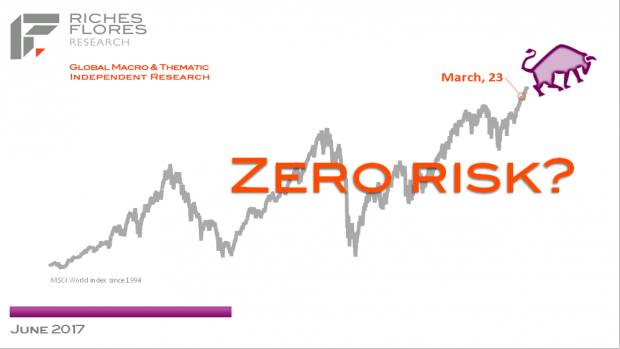The summer’s economic indicators have been relatively reassuring on the health of the global economy. When consumer spending has been sluggish, companies have begun to invest and hire again, contributing to an improvement in the outlook for future growth and leaving room for a more robust recovery in world trade. The only missing item is inflation, which the central banks need if they are to commit to a more significant reduction in their monetary support. On this score, however, the horizon has clouded up during the summer while, in addition, political tensions have been exacerbated.
Archives par catégories : GLOBAL MACRO
Day to day Global Macro Context Analysis
Stay the course or wait for a deeper correction before repositioning on European indices?
We might ultimately be vindicated; only time will tell. But one thing is certain: we were mistaken in predicting since the beginning of June that European markets would continue to rise. We can take some comfort in the Eurostoxx index’s performance in dollar terms, a positive 1.7 % between May 31 and August 17, with nearly identical trends in indices on both sides of the Atlantic. This is not much consolation, however, given that we had been anticipating an appreciation in the euro, and this is exactly what has happened. The euro now stands at USD 1.18.
BMG July 2017 – Investment is boosting our leading activity indicator
Our activity indicator jumped to 0.5 in July, after figures of 0.1 in June and 0 in May. The improvement in US data and the stronger overall trends in investment and exports were behind this good result, despite mediocre consumer spending figures. Our inflation indicator is slightly positive again after falling for two months, although it has not shown any real trend in the last three months.


It’s not all about the ECB, and the rise in long yields should soon be over

It is now almost certain: judging by the minutes of the ECB’s most recent monetary policy committee meeting, Mario Draghi’s comments during the Sintra forum on 27 June were no accident, but carefully devised to counter the embarrassing flattening of the yield curve in the previous few weeks. That subject is where the 8 June minutes begin, suggesting that there was an intense debate about what most members of the monetary policy committee regard as an anomaly. At a time of rising confidence in the economic outlook, the ECB was clearly expecting the yield curve to steepen, particularly after the French elections removed the main political risks.
Wage rigidity to low unemployment: an aberration? Not really.
Central bankers and economists seem baffled by the fact that wages are failing to accelerate in economies where low unemployment is pointing to full employment, which traditionally means rising pressure on wages. In response, central banks are on the alert, fearing that this apparent anomaly will correct itself any time, possibly resulting in a sudden acceleration in pay for which they might be unprepared. In Germany, the unemployment rate is at a post-reunification low of 5.7% and the Bundesbank has been watching this risk closely for almost two years.

BMG June 2017 – Bad weather for economic activity and markets
Our overall macroeconomic barometer has fallen again, to 0 in June, after falling sharply to a revised 0.1 in May. The decline is due to weaker momentum on all fronts in the USA, which mixed performance in other countries failed to offset. Despite the downturn in business and export survey results, investment is holding firm in all regions for the time being. Our inflation indicator saw little movement, coming in at +0.1 in June versus -0.1 in May.


Quarterly macro and asset allocation – Zero Risk?
Helpful financial conditions and the removal of major political risks in Western countries are maintaining a healthy appetite for risk. The bull run has gone a long way, but seems capable of going further although the path ahead is increasingly strewn with pitfalls, requiring investors to watch out for a large spectrum of risks.
Content:
- Global overview
- Global GDP and inflation forecast update
- Interest rates and exchange rate forecast update
- Investment recommendations and global asset allocation
The global auto cycle has had its day. The sector is not immune from a call into question in Europe
Since the beginning of the year, the European auto sector has been one of the weakest performers on the stock market. While economic growth prospects tend to be revised upwards in a context of lower deflationary pressures, we would have expected more encouraging signs from this sector. It seems that such a case is increasingly unlikely. Weighed down by weak domestic growth prospects after two years on the rebound, the sector finds itself dealing with the fallout of weak global prospects, the US administration’s ill-advised moves with respect to reflation, the decline in the price of oil and now, the rising euro… This is the view on a sector with characteristics that place it at the very heart of the challenges facing the financial markets in recent months.

